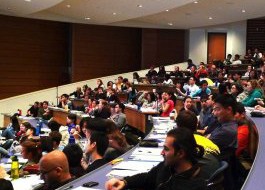
More than two months after Charles Murray visited Middlebury College and was shouted down there, the college has finished reviewing and in some cases punishing students who were involved in preventing him from giving his talk.
The college punished a total of 67 students for their (varying) roles in what happened during Murray's visit to campus. A majority of the punishments appear to be probation. Some of the students received "official college discipline," which is more serious than probation but does not involve suspension.
Middlebury on Tuesday announced the completion of its review process. The college also announced that the Middlebury Police Department (as in the Vermont town, not the college) "had concluded its investigation into the violence that took place following the event as Murray and Professor Allison Stanger left the building. The department said it has been unable to identify any specific individual responsible for the injuries sustained by Stanger. MPD also said it had established that as many as eight masked individuals were in the area and used tactics indicating training in obstruction."
While the department said that "it had identified a number of other people who were in the crowd of more than 20 people outside the event venue, on consultation with the Addison County State’s Attorney it was determined that there was insufficient information to charge any specific person who participated in damaging the car or interfering with or blocking the car’s progress as it exited the parking lot."
Ever since the Murray visit, Middlebury has been subject to national scrutiny over how it would punish those involved. Some have argued for tough punishments, while others have said that no punitive sanction would be appropriate.
 Middlebury College Middlebury College Facebook
Middlebury College Middlebury College Facebook
Murray is the co-author of The Bell Curve, a book widely denounced as racist for its conclusions on race and intelligence, but he was not planning to speak about that book. Stanger was the professor selected to lead questioning of Murray. While she defended his right to speak, she never endorsed his views.
Middlebury policy permits protests of speakers but not activities that prevent someone from speaking. While many were involved in doing just that (and were seen on social media doing so), still others were involved in what has widely been seen as a more serious incident after the talk, when Stanger was attacked outside and the car carrying her and Murray from the event was attacked.
Middlebury announced early on that it asked the town police to investigate that part of the incident. In addition, college officials said early on that they believed some of those involved in the more violent portion of the protest were not students or otherwise affiliated with the college.
Middlebury officials have refused to answer detailed questions about the punishments, citing privacy issues with regard to the students. But they have indicated that they expected to have different punishments for different groups of students, depending on their level of involvement.
The college's announcement Tuesday said of the more serious "college discipline" punishment that some received that it "places a permanent record in the student’s file. Some graduate schools and employers require individuals to disclose official college discipline in their applications."
The description of "college discipline" on the college website states, "Students may receive a letter of official college discipline when their actions have demonstrated disregard for Middlebury’s community standards and policies such that an additional infraction of college policy will most likely result in suspension from Middlebury.
Official college discipline is intended to encourage immediate improved behavior, and acceptance of responsibility and growth by establishing this incident on the student's permanent record. Official college discipline is a permanent part of the student's file. Students who receive official college discipline must answer affirmatively if they are asked whether they have been subject to college discipline. Parents or guardians are informed when students receive official college discipline."
Read the original article on Inside Higher Ed. Copyright 2017. Follow Inside Higher Ed on Twitter.




